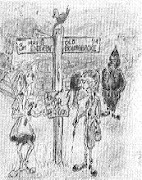
The anniversary, it was, of the day I met the woman whom I called ‘M’, Mavis, a silly name I know, but the one I have selected for my muse, my memory, my dream and my love.
I have written so much about her privately, pages of notes and aborted poems, but have hesitated to make my thoughts public. But the beauty of a blog is that I can give myself the illusion of anonymity and know that only a few people close to me will know the state of my mind, of my heart.
‘My heart’. Those words arouse the cynic within me. I hear him laughing at me. ‘For Christ’s sake, haven’t you learned anything from life? Don’t you know that it never, ever, works? That you always get hurt? That you do a fair bit of hurting yourself?’
But for the first time in years I don’t care. For the first time in years I do care.
*
I met her in an office – let’s call it a bank – where I was transacting some financial matter. She was business-like, but friendly. I detected a sense of humour. I admired the way she dressed and the accent in her voice. I liked the curve at the corners of her mouth, the touch of exoticism in her face, her nose and her eyes. She was slim and her silvery-white hair was threaded through with individual strands of black.
She was beautiful. I realised only later that I had fallen in love.
The older, the wiser? Bollocks! ‘Altior, stultior’ is what I think the Romans said.
*
It took me three months to do anything about it. Three months are pretty precious at my time of life. What happened to that arrogant bastard who once brushed off rejection the way a salesman does, knowing one sale in fifty is a good ratio of success?
But at least I thought I had gauged her personality well enough to know that if I was going to be told to bugger off it would be done in a way considerate of my feelings.
So, in February, we met, and became friends.
Friends.
*
I’ve asked myself why I was so drawn to her. The world is full of attractive women, even Lincoln. What was it that made me want to go and buy flowers – flowers, for heaven’s sake!
She is everything I knew she would be. Hers is the kind of beauty that will never age. And her personality matches it. She is kind, gentle and good. She’s my complete opposite. She’s gregarious, organised, hard-working, positive. My God, she actually likes people! And, not surprisingly, everyone I’ve introduced her to likes her. ‘What a lovely woman,’ they say. With me, it’s ‘Well, he’s all right when you get to know him.’
That’s what they think.
Says it all, doesn’t it?
*
I was doing a crossword the other day. I was struggling until I came across one particular clue. I don’t recall what it was, but the answer came straight into my head and I wrote it in without checking. I didn’t need to check.
The answer was UNREQUITED.

















